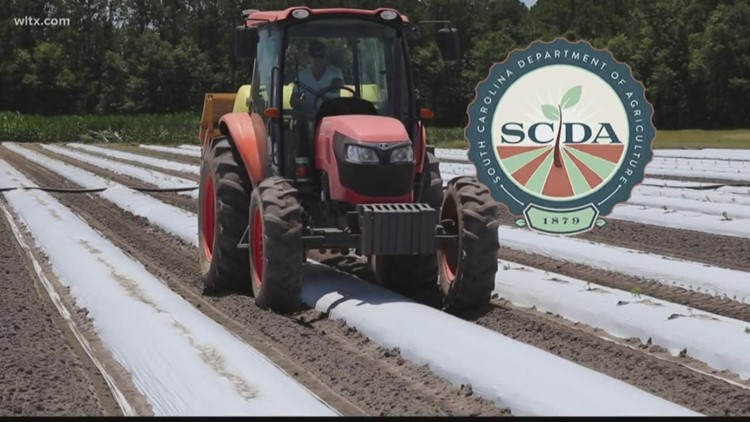COLUMBIA, S.C. — The US Department of Agriculture (USDA) has invested more than $243 million in grants to support growers and producers of specialty crops – including fruits, vegetables, tree nuts and nursery crops – through two USDA programs: $169.9 million to the Specialty Crop Block Grant Program (SCBGP) and $74 million to the Specialty Crop Research Initiative (SCRI) grants program.
Although South Carolina did not get any grants from the SCRI, a total of $601,531.03 in SCBGP monies was granted to the South Carolina Department of Agriculture (SCDA) for 12 projects:
- Produce Safety Rule On-Farm Produce Safety Improvements and Grower Training Grant ($30,000): to assist produce growers in enhancing food safety on their farms by offering Produce Safety Rule Grower trainings at a reduced cost and will provide a cost share program to assist produce growers in implementing on-farm food safety improvements in order to comply with the requirements of the Food Safety Modernization Act, Produce Safety Rule.
- Exploring Novel Armillaria Root Rot Management Strategies in Peaches ($79,149): Clemson University will develop novel strategies to manage Armillaria root rot (ARR) in peach by deploying a two-prong approach that involves recombinant virus-mediated host-resistance development and nucleic acid-based bio-pesticide application. This information will be made available to the stakeholders through grower meetings and field days and communicated to the US Environmental Protection Agency.
- Evaluation of Agricultural Carbon Waste Streams to Facilitate Anaerobic Soil Disinfestation in Watermelon Production ($50,000): In partnership with Clemson University, Growers for Grace will investigate the viability of agro-industrial plant-based waste streams as a sustainable carbon source in Anaerobic Soil Disinfestation (ASD). This collaborative research will explore the efficacy of these organic waste streams against the proven ASD standard in a watermelon field trial in South Carolina. This project will also identify and evaluate efficiencies gained by using these specific substrates as an ASD facilitator relative to the commercial practice and ASD standard.
- FoodShare Greenville: Supporting Local Farms and Low-Income Consumers in Greenville, SC ($41,575): Through this project, Mill Village Farms will increase the number of boxes per cycle from 800 to 850 and ensure that 20% (over 63,000 pounds annually) of the produce included in FoodShare boxes annually, or an average of 2 items/cycle, is a specialty crop grown in South Carolina.
- New Winter Legume Cash Crop: Developing Improved Pea Cultivars for SC Organic Cropping Systems ($56,530): Clemson University (CU) will develop organic dry pea cultivars (Pisum sativum L.) adapted to SC using on-farm field selection to increase crop yield and nutritional quality. CU breeding goal is to develop organic pea cultivars adapted to South Carolina’s environmental conditions, increasing seed protein and desired carbohydrate ratios with micronutrients for better human and animal health.
- Assessing Nematode Populations Damaging Bermudagrass in South Carolina ($22,196): Turfgrass nematode researchers at Clemson University will address growing concerns with pathogenic nematode populations that are damaging bermudagrass by formulating new threshold guidelines for soil populations, examining non-pesticide tools of reducing populations, and enhancing grower knowledge through novel educational programs that engage growers across the state.
- Taking Disease Detection to the Sky: Evaluating Satellite Imagery for Virus Disease Detection in Peach Trees ($45,145): This project is aimed at developing a large scale, early detection method for virus diseases in peach orchards. Clemson University researchers will collect and analyze satellite imagery and virus prevalence results. Grower partners will assist with site selection in commercial orchard blocks and assist with method validation. This will ultimately reduce costs associated with virus testing and extend the lifespan and productivity of peach orchards.
- South Carolina Statewide Honey Pollen Analysis ($73,050): The South Carolina Beekeepers Association will select 15 local bee associations, resulting in 20 collection locations throughout the state of South Carolina (15 rural + 5 urban) based on the 6 S.C. ECO Regions collecting honey samples weekly during the nectar flow and check/ collect nectar as available during the nectar dearth’s for honey pollen analysis to determine:1) When and which plants typically bloom. 2) What the nectar sources are for honey in particular areas of the state. 3) If maples that bloom end of January/early February are both a pollen source and honey/nectar source. The honey samples will be analyzed for pollen at universities throughout the United States and one or more articles will be published with the results. South Carolina is the first state to do this analysis statewide. Replicating this study in the future will help determine changes to the SC ecosystem.
- Enhancing the South Carolina Specialty Crop Industry Through Education and Trade Show Promotion ($57,106): The South Carolina Specialty Crop Growers Association in conjunction with the South Carolina Department of Agriculture will work together to promote the specialty crop industry through a cost share program that will assist growers in attending identified domestic industry trade show and conferences. This proposed project will benefit South Carolina specialty crop producers, growers, wholesalers, and other allied industry member.
- Value-adding Packaging at GrowFood Carolina: Creative, Innovative Investments for Specialty Crops in South Carolina ($24,135.17): GrowFood Carolina, the local food hub of the Coastal Conservation League, will increase specialty crop sales for our 120-plus South Carolina partner growers by contributing to the development of more marketable, in demand specialty crop products that stand out among competitors by continuing the following approach over the next year.
- Determining Prevalence of Nematodes Damaging Strawberries in South Carolina ($54,871): Following statewide survey for nematodes occurring in strawberry fields in South Carolina, greenhouse studies will be conducted at Clemson University to determine new action threshold for the most commonly occurring nematode, and the results will be disseminated to stakeholders through extension and scientific publications, grower meetings, field days, and scientific meetings.
- Enhancing the South Carolina Specialty Crop Industry Through Value-added Packaging ($18,259): The South Carolina Specialty Crop Growers Association will administer a program for small and medium sized specialty crop growers. This project will provide funding for a cost share reimbursement program to offset the burdensome cost of packaging expenses for growers. This project will enable growers to increase their share of South Carolina’s specialty crop industry while complying with market outlet packaging requirements.
To learn more about the projects -- and how to apply for grants -- go to the USDA website.



